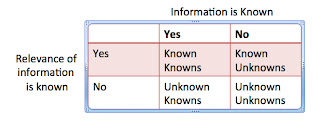“There are known knowns; there are things we know we know.
We also know there are known unknowns; that is to say we know there are some
things we do not know.
But there are also unknown unknowns – there are things we do not know we don't know.”
So, if you consider his response as the ubiquitous grid then he was mentioning that in any situation we either have or do not have information about it, and we either know its relevance or we don’t.
So it isn’t foolish to say that there is category of information about a situation where we have no information and we don’t know it’s relevance. Hard to know the relevance of information that you don’t have. But logically it’s correct.
What he didn’t mention, which in many ways is more important, was the category of the unknown knowns. Those pieces of information that we don’t know the relevance of. The facts that we haven’t found a place for: joined up the dots so to speak. These are of a much greater concern. And in his case there was plenty of information known about Iraq that properly understood would have made the aftermath of the invasion less of a disaster.
For example details were known about the 9/11 hijackers enrolling in flight training, not being interested landing the planes, and two being on watch lists. Enough to generate warnings in the field. But crucially no one joined the dots at the command level. This is not a critique of what the CIA and FBI should have done, it is an illustration of not knowing the relevance of known facts.
Another example is the sub-prime mortgage disaster. In this case lots of information was known, in many cases warnings were sounded. But at the leadership level of both the financial industry and government no one joined the dots, or, in some instances, wanted to join them.
Yet another example is the Titanic. There the captain knew about the presence of icebergs, but who, in his arrogance and folly, ignored the information, deeming it irrelevant.
Also this concept occurs in the realm of unintended consequences. That sad state of affairs were the results of a given policy are more than expected, and not in a pleasant way. In many of these instances the facts were known, but their implications were not.
So project managers should be very careful of the unknown knowns. Just because you and your team don’t recognize the importance of a piece of information doesn’t mean it has no value or impact. Make sure all your information is reviewed by a wide range of specialists. You never know, one of them might join the dots and save your career.
|
”
|
Wednesday, May 2, 2012
Project Managers and Risk - Rumsfeld Matrix
Donald Rumsfeld attracted a fair share of ridicule when he
famously announced that:
Subscribe to:
Post Comments (Atom)

No comments:
Post a Comment